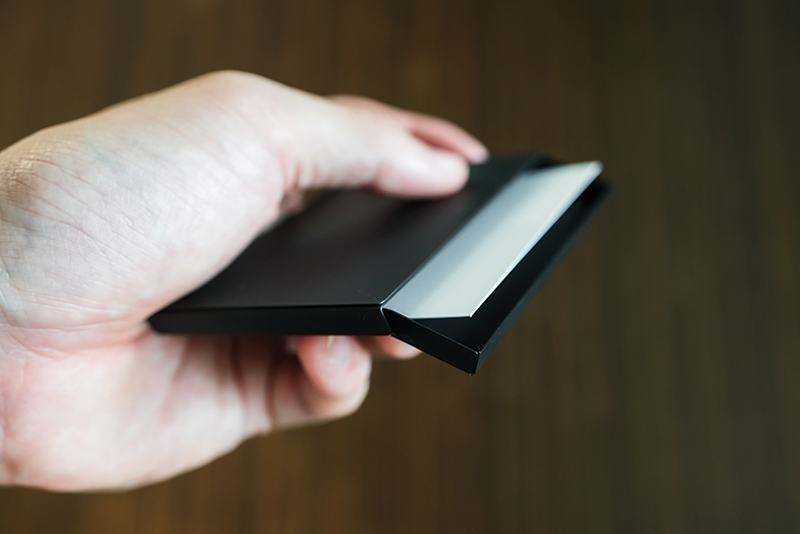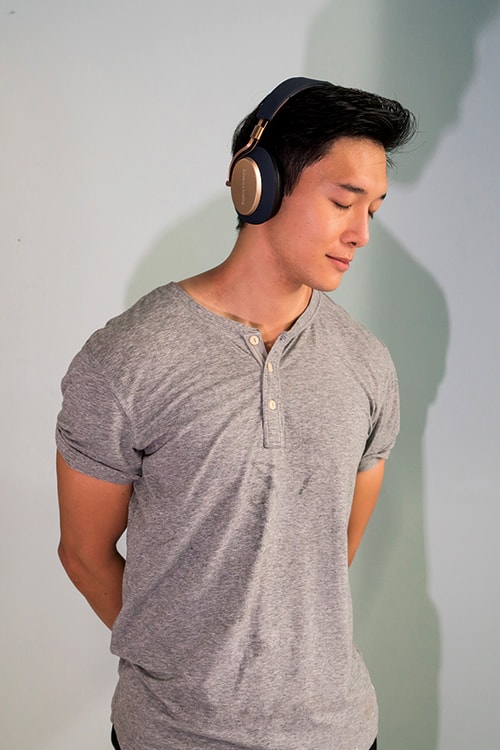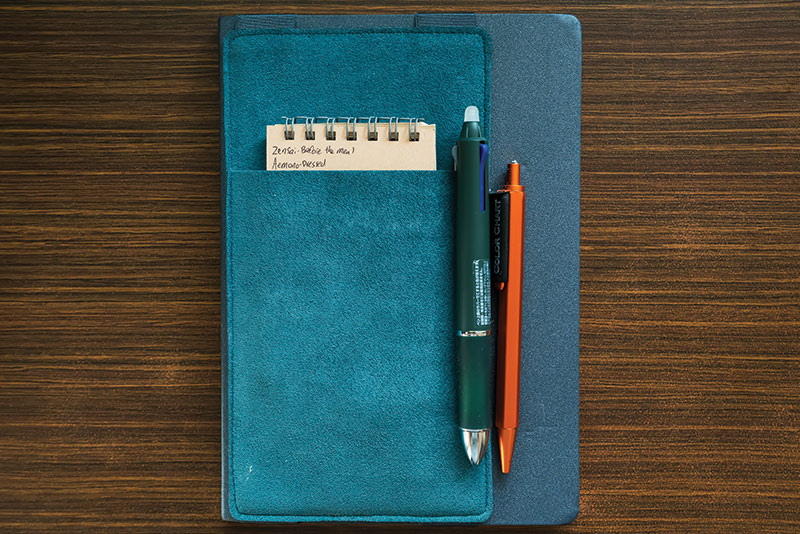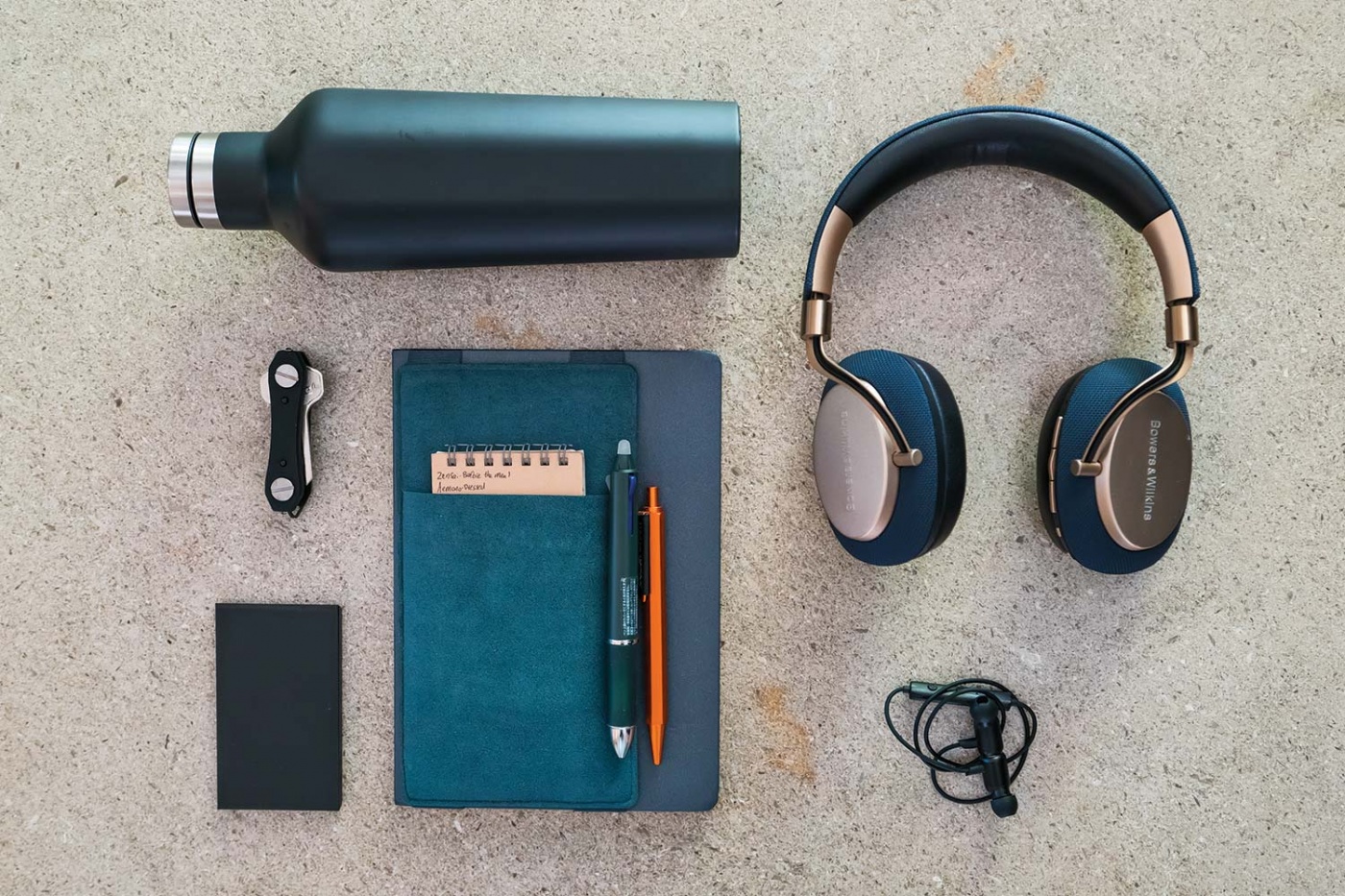Everyday Essentials with Lennard Yeong
Lennard Yeong is a former engineer turned chef, who is most recognisable as one of the contestants of the first season of MasterChef Asia. Though his decision to enter was based on sheer curiosity, he managed to successfully reach the finals and placed runner-up in the illustrious cooking competition.
Despite the fame and opportunities that come with the show, like landing a new job and hosting several shows on food with Channel NewsAsia, Lennard has always remained grounded. His ethos is about cooking good food, feeding people and exposing his audience to the wonders of food—was never about becoming a reality TV star or attaining popularity. Aptly describing himself on his Instagram page, “Once an engineer, now on a journey to learn about food”, Lennard shares with us his everyday essentials, which embody his practical and down-to-earth personality.
What are your 5 everyday items that you can’t live without?
My notebook, cardholder, key organiser, wireless headphones or earphones, and a water bottle.
How do these items help to improve your lifestyle?
My entire notebook set comes from a Japanese brand—Kunisawa. It comes with a slightly sparkly finish that isn’t over the top. I have a green felt sleeve over its cover which allows me to slip in an extra small notepad and two pens. I’ve just started a new job where one of my core responsibilities is writing recipes, therefore having a notebook with me is absolutely essential to stay organised, and to keep records of what I have done.

My cardholder is also from Japan. It comes in a sleek matte black finish, which I’m a little obsessed with at the moment. It has a beautiful sliding mechanism that allows a small section of the cardholder to fold down ever so slightly in order to access your cards more easily. I love these little details; it’s such a well-thought-out and well-made product.
The key organiser is the newest item in my everyday carry. I have to use keys at work and having everything in one body just helps me ensure that I have a lower tendency to lose individual keys (which has almost happened). The organiser also comes with 2 LED lights that are surprisingly bright—it’s always good to have more lights at your disposal.

My audio delivery of choice depends on my mood. I take the train to and from work, so having a pair of headphones or earphones really helps me zone out and be in my own world. I shuffle between the B&W PX headphones and the Anker bluetooth earphones, depending on how much I want to carry in the day. The earphones are definitely much lighter and more portable, but the sound quality of the PX headphones are amazing and the noise cancelling function works very well.
Last but not least, I have a matte black tumbler bottle from Corksicle. I have a tendency to forget about drinking water throughout the day, but having this bottle around makes me drink a lot more water. It has double walls and can keep water cold for 25 hours, which is great for me because I like to drink cold water. I didn’t realise this when I bought it, but the tumbler has a rubber ring at the bottom of the bottle—it is such a small detail but it makes a huge difference. The bottle never slides around on surfaces, and it barely makes a sound when it comes into contact with surfaces.
[Read: Everyday Essentials with Shirley Wong aka Little Miss Bento]
Do these items reflect your personality too?
I tend to like objects that are minimalistic and understated, I don’t really like items with too many logos on them—the items that I carry are a reflection of that.
Is there a story behind any of these items?
I can’t say that they do because these are just objects to me. These items will be replaced eventually and I would be fine with that.
How did your engineering background aid in your current path as a chef?
I’ve learnt a lot from engineering that helps me in the kitchen and beyond. There’s a common consensus that engineers have this ability to ‘think like an engineer’, and I never really understood what that meant until I’ve to deal with real-world problems. Subconsciously, I try to break down problems into parameters, isolating variables, and then trying to solve them systematically. This has helped me tremendously with my job now, as creating recipes involves a lot of experimentation and failures, but understanding why things fail is crucial in order to achieve a successful recipe.
Before you made the leap, did you have any doubts or uncertainty? Is being a chef your True North?
I’ve felt uncertainty at every step of the way and it’s scary, giving up a stable job to venture into the unknown. I’ve been incredibly lucky to land a great job right now, and I have never looked back since. The feeling of waking up raring to go, motivated to work and excited to find out what I will discover every day, is very hard to find and I am grateful for that.
What is your typical day like?
It usually starts with me doing a grocery run if I am low on ingredients in the pantry. I will then head into the kitchen and fill up my bottle. Checking my work emails will be next, replying to any if necessary. Following that, I will open up my notebook and look at some of the ideas I have been working on or ideas in the pipeline. For the rest of the day, I basically head into the kitchen and start cooking. I work alone and don’t go out for lunch usually as I’m constantly eating and tasting what I’m making. Playing some music also helps keep me sane. I end off the day by cleaning up the kitchen in the evening and check my emails one last time before I take the train home. I rarely eat dinner because I’ve been eating the whole day and rarely ever feel hungry at night. If I have enough energy, I’ll usually hit the gym before heading to bed.
How has your daily routine changed since you made the career switch?
The biggest change would be not having to wake up, drag my feet out of bed and dread going to the office.
How do you gain inspiration for your cooking?
I’ve been very inspired by Japanese food and that has been my focus for the past year or so. Books and Instagram are my main source of inspiration and YouTube has also been an incredible resource when I am looking for technique-specific explanations.
How do you record your ideas? And long does it take from ideation to implementation?

I use a notebook. I’ve learnt that if you rush into an experiment without proper planning on how to go about tackling a dish, or even properly documenting your recipe, it will be very difficult to get a recipe right consistently.
Are there any tools that you must have when you cook?
My number one tool is actually a probe thermometer, it is the simplest and quickest way to achieve consistent recipes every time. I also use a heat-resistant non-stick spatula for a lot of things like Sautéing and mixing things. Knives are also another key necessity in the kitchen.
When you were on MasterChef Asia, were you able to bring your own equipment? If you had your pick, what would be your ideal kitchen tools?
No, we had to use what was available in the pantry. Everyone has access to the same things and I think that’s part of the fun and challenge. I don’t think I would’ve brought anything if given the choice.
What is your favourite cooking technique?
It is constantly changing. I’ve been obsessed with many things: American BBQ, cooking eggs in a variety of ways, grilling over charcoal; but lately, I’ve been working with the steam ovens by Miele and the capabilities are very impressive.
How about favourite cuisine?
A tie between Local and Japanese food.
Do you see yourself as an artist?
That’s a difficult question. It depends on how you define art. Personally, the title is a bit too fancy for me—I just want to cook good food, feed people and pass on the knowledge. You can make simple things sound complex but it doesn’t necessarily mean that they are, and I’m not embarrassed to say that the things I enjoy doing are simple.
What is a dish that you have been trying to create but haven’t quite succeeded yet?
I’ve recently did a very soft set custard that took me quite a while to get right. When I was visiting Japan earlier this year, I had zosui, which is a Japanese version of porridge, similar to Teochew porridge. I wanted to create a Laksa zosui, but when I tried it for the first time, the flavours didn’t quite come together the way I had imagined. I think I’ll be going back to that dish later this year.
What is the best culinary experience you ever had?
I’ve had quite a few but my favourite is probably going behind the counter at my favourite restaurant in the world, Kyo Aji in Tokyo, to learn how to make their signature dessert called Kuzukiri. After watching the master make it, I got to try it on my own. I think I lived off that high for weeks!
What excites you the most about food?
That there are still so many possibilities, so many dishes that have yet to be created and ingredients I haven’t discovered. The more I learn about food, the more I realise how little I actually know. That excites me, the fact that my journey with food is really only just beginning.


